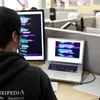How Bengaluru-based Masai School aims to bridge the skills gap and turn engineers into coders
Bengaluru-based Masai School is a coding bootcamp that trains tech aspirants in full-stack, web, and android development. The programme lets students pay the course fee after they get a suitable job.
Report after report indicates that India’s youth isn’t job and future-ready. A pain point that Prateek Shukla, Nrupul Dev, and Yogesh Bhat aim to solve with Masai School, a coding bootcamp that offers learning programmes to create skilled professionals.
The Bengaluru-based startup, which was launched in June 2019, is open to anybody seeking training in coding. Interestingly, learners are enrolled for free at Masai School for the six-month, full-stack web development programme along with personality development and soft skills coaching. They can pay the course fee at a later date, after getting a suitable job.

Female coders at Masai School.
The trio, who met in March this year, worked on one problem statement:
“Numerous engineering graduates are not capable of creating even a few basic lines of software code despite spending four years at engineering colleges.”
With corporates and companies now focusing more on skill sets rather than educational backgrounds, the Masai School aims to fill India’s coding-specific skill gap.
The six-member startup received undisclosed seed funding from India Quotient and a few angel investors, including Sampad Swain, CEO and Cofounder of Instamojo.
Getting started
Prateek, the CEO of Masai School, was previously the Co-founder and CEO of home rental startup Grabhouse. Later, he worked as the business head for Quikr, which acquired Grabhouse in an all-stock deal in November 2016. Grabhouse raised $10 million from the likes of Sequoia Capital, Kalaari Capital, and India Quotient.
Nrupul, the CTO, is a chemistry major from IIT-Kanpur. Prateek's senior at IIT-K, he was tech lead at multiple firms before he started teaching and orchestrating the stack at Masai School. Prateek met Yogesh, Senior VP of Masai School, through his wife; Yogesh now handles strategic alliances and programme design.

From left to right: Prateek Shukla, Nrupul Dev, Yogesh Bhat.
The trio met in March this year, and after spending a couple of months of brainstorming, launched coding bootcamp Masai School in June 2019. The first batch started at the 91Springboard facility on Hosur Road, Bengaluru; the 23rd week of the 24-week programme is on at present. The second batch started in August this year.
How does it work?
The bootcamp offers courses in Android development, full-stack development, and web development. The training model is divided into 100 hours each of coding, soft skills, math learning and data structures.
It operates between 9 am to 9 pm, six days a week, out of its centres in Bengaluru and Patna. The mode of instruction is at the physical centres via Zoom, Slack, Github and Daily Scrum; Masai School doesn’t offer any online courses.
Speaking on whether it reverse engineers to design the curriculum, CEO Prateek says,
“Considering all of us come from a tech background, we are already aware of what the industry looks for. But we are keen to make the students holistic software engineers rather than train them with limited tools and languages in limited capacity.”
Apart from technical skills, the school also equips candidates with soft skills and analytical thinking.
The school operates on the basis of Income Share Agreement (ISA). Students don’t need to pay a tuition fee. All aspirants go through a pre-enrollment course for two weeks, before they are selected for the main course. The duration of the main course is 20 weeks, and it is designed to train learners and get them skilled and job-ready.
Instead of charging a fee, Masai School signs an agreement with students. A student who finishes his/her course needs to pay Rs 3 lakh after s/he gets a job with an annual salary of at least Rs 6 lakh. The amount is to be paid back in instalments: 15 percent of the monthly income for three years (till they pay Rs 3 lakh).
If a candidate opts out of the ISA model, s/he can pay an upfront amount of Rs 2 lakh and enroll for the course.
After the training
After completion of the programme, the hiring partners of the coding school spend a week with the students to closely assess and shortlist candidates they would want to hire.

Masai School’s hiring partners include Sharechat, UrbanClap, Swiggy, MPL, Ola, Instamojo, Flipkart, Lean Agri, Propelld, Vyapar, Cleartax, Revvsales, Flynote, Lendingkart, Nobroker and Workex.
Prateek said, “The first batch had 17 students join the bootcamp, of which four dropped out and one student left for higher education. Off the remaining 12 students, 50 percent have gotten placed, while the rest are awaiting their offer letters.”
YourStory recently met Mahesh Pawate, a student of Masai School, who was rejected in 39 interviews, but was placed at a tech company after completing the course.
Mahesh, who belongs to Sangli, Maharashtra, has a master's in computer applications, and came to Bengaluru to find a job as a developer. He had undergone some training in coding from Udemy and put in a lot of his own time before joining the programme. But that wasn’t enough. But, after completing this programme, he makes 4X the money that he was supposedly worth at the 39 rejections.
Market landscape and future
A 2018 report by India Skills says around 48 percent of engineers in the country are unemployed. Pearson Research says 95 percent of Indian engineers are not equipped for development and coding jobs.
Aditya Malik, CEO of TalentEdge, believes that the edtech sector will see a lot of unique business models and will be tested in the future.
“Online real-time classroom is a valid education model in India. India is a growing market and there is a lot of scope for companies in the edtech sector across categories, though the dynamics are still nascent,” he says.
There are other players that follow the same model, including MountBlu Technologies, AttainU, Pesto Tech, and School of Accelerated Learning.
According to Verified Market Research, the global coding bootcamp market was valued at $399.91 million in 2018 and is projected to reach $889.37 million by 2026, growing at a CAGR of 10.70 percent from 2019 to 2026.
As of now, the Masai School founders want to cater only to startups in India, and not the corporate services segment.
“The absorption capacity for tech talent is considerably higher in startups, compared to the other side,” Prateek says.
The founders, who designed the courses from scratch and do the teaching themselves, are looking to expand further in faculty strength and open more branches soon.
(Edited by Teja Lele Desai)




![[YS Exclusive] Why San Francisco’s coding bootcamp Lambda School is placing its bets on India](https://images.yourstory.com/cs/2/730b50702d6c11e9aa979329348d4c3e/TeamatLambdaSchool1569404013364png?fm=png&auto=format&h=100&w=100&crop=entropy&fit=crop)

